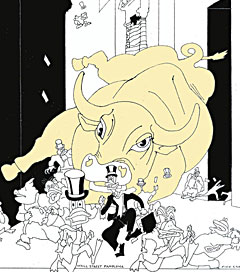John Plender, a columnist at The Financial Times, seems mystified by something that has become obvious lately: Bond vigilantes are only going after countries that no longer have their own currencies.
In a column published on Aug. 16 he writes: “The underlying logic is that no country defaults on its domestic bonds if it retains the right to set the printing presses in motion. Yet it seems counterintuitive that bond markets, with their traditional fear of inflation, should punish a country for not being able to debase its currency.”
Oddly, he seems unaware of the pretty good explanation offered by Paul DeGrauwe, an economist and researcher at the Center for European Policy Studies, which I’ve sketched out a bit further.
Part of the answer is that countries on the euro are stuck with a severe competitiveness problem that can only be resolved with grinding deflation, making their debt problems worse.
On top of that, however, is the proposition that countries without printing presses are subject to self-fulfilling crises in a way that nations that still have their own currencies are not. The point is that fears of default, by driving up interest costs, can themselves trigger default, and that there’s a crossing-the-Rubicon aspect to default: once a country crosses that line it will probably impose fairly severe losses on creditors. A country with its own currency isn’t in the same position: Even if it is pushed into some inflation, no red line need be crossed.
That’s why America isn’t Greece, and why Britain is being foolish in imposing euro-zone-type austerity on itself.
Bearded American Economists Swoop to the Rescue
According to a Bloomberg article published on Aug. 15: “Bank of England policy maker Adam Posen’s 11-month push for more stimulus is now shaping the debate among officials as they consider whether the U.K. needs more quantitative easing to fight the danger of Europe’s crisis. With no policy maker seeking an interest-rate increase after Spencer Dale and Martin Weale switched votes, the discussion on the Monetary Policy Committee has shifted toward Posen’s agenda.”
Go Adam! Adam Posen studied Japan during the 1990s, and was a member of the club (also including yours truly) that worried that Japan was an omen for other advanced countries. And I have to say that the Bank of England is showing a lot of intestinal fortitude right now, holding to expansionary policies despite an inflation bulge it knows is temporary, but which nonetheless puts it under pressure.
Then again, Monetary Policy Committee members don’t fear being charged with treason, or lynched in Texas.
© 2011 The New York Times Company
Truthout has licensed this content. It may not be reproduced by any other source and is not covered by our Creative Commons license.
Paul Krugman joined The New York Times in 1999 as a columnist on the Op-Ed page and continues as a professor of economics and international affairs at Princeton University. He was awarded the Nobel in economic science in 2008.
Mr Krugman is the author or editor of 20 books and more than 200 papers in professional journals and edited volumes, including “The Return of Depression Economics” (2008) and “The Conscience of a Liberal” (2007).
Copyright 2011 The New York Times.
Join us in defending the truth before it’s too late
The future of independent journalism is uncertain, and the consequences of losing it are too grave to ignore. To ensure Truthout remains safe, strong, and free, we need to raise $43,000 in the next 6 days. Every dollar raised goes directly toward the costs of producing news you can trust.
Please give what you can — because by supporting us with a tax-deductible donation, you’re not just preserving a source of news, you’re helping to safeguard what’s left of our democracy.
